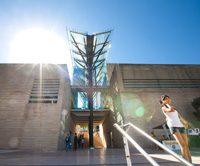Current Debates in Media and Culture - ARTS3097
Faculty: Faculty of Arts and Social Sciences
School: School of the Arts and Media
Course Outline: School of the Arts and Media
Campus: Sydney
Career: Undergraduate
Units of Credit: 6
EFTSL: 0.12500 (more info)
Indicative Contact Hours per Week: 3
Enrolment Requirements:
Prerequisite: 48 UOC overall, including 6 UOC at level 1 and 6 UOC at level 2 in one of the following streams, MCT. Or ARTS1090, 6 UOC in level 2 Prescribed Media Electives and enrolment in a Media single or dual program
CSS Contribution Charge: 1 (more info)
Tuition Fee: See Tuition Fee Schedule
Further Information: See Class Timetable
View course information for previous years.
Description
Subject Area: Media, Culture and Technology
Media are centrally implicated in our lives – both public and private. From election campaigns to radicalisation; from transnational personal relationships to gaming; from the constitution of the global economy to online dating; media technologies play a crucial role. They have the potential to create social and political change as well as to disrupt personal lives in ways unimaginable a decade or so ago.
In this course you will examine current, ‘live’ topics in media, using relevant concepts and frameworks to investigate and understand present-day media-related issues. During the course, you will be encouraged to capture and study media-related events and developments as they unfold. At the beginning of the semester three to four significant, exemplary, on-going topics, news stories, or developments involving the media will be chosen. The rest of the semester, including lectures and tutorial readings and discussions, will be organised around two to three broad themes that are based on the chosen topics.
The key focus will be on the application of relevant theories, frameworks and concepts on these topics, and an exploration of appropriate methodologies for their analysis. The topics covered could include, for instance, digital media affordances, political communication as public strategy, online radicalisation, social media use and counter-publics, the political economy of IT industries, or surveillance and security, covering the themes of media in the public domain and media in the private domain, as well as the intersections of the two. The methodologies discussed could, in turn, include textual analysis and deconstruction, auto-ethnography, and conjunctural analysis. The emphasis will be on situating media analysis and theory within broader socio-cultural and political contexts.










